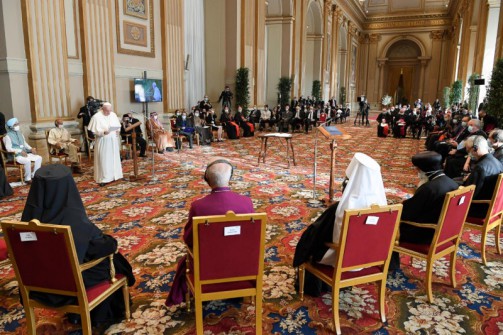Commitment for Action of Religious Leaders
"We are caretakers of the natural environment with the vocation to care for it for future generations and the moral obligation to cooperate in the healing of the planet".
Joint-Statement of Religious Leaders, Vatican 4.10.2021
We commit to taking much more serious action.
The followers of religious traditions have a crucial part to play in addressing the crisis of our common home. We commit to taking much more serious action. Young people are demanding that we listen to the scientific insights and that we, their elders, do much more.
First, we commit to advancing the educational and cultural transformation that is crucial to sustain all other actions. We underline the importance of:
• Deepening our efforts to bring about a change of heart among the members of our traditions in the way we relate to the earth and to other people (‘ecological conversion’). We will
remind our communities that care for the earth and for others is a key tenet of all our traditions. Recognizing the signs of the divine harmony present in the natural world, we will strive to
incorporate this ecological sensitivity more consciously into our practices.
• Encouraging our educational and cultural institutions to give priority in their programs to relevant scientific insights, to strengthen integral ecological education, and to help
students and their families relate to nature and to others with new eyes. Beyond the transmission of information and technical knowledge, we want to instill deep-rooted virtues to sustain the
ecological transformation that is required.
• Participating actively and appropriately in the public and political discourse on environmental issues, sharing our religious, moral and spiritual perspectives and uplifting the
voices of the weakest, of young people, and of those too often ignored, such as Indigenous Peoples. We underline the importance to reframe environmental debates from being about technical issues
alone to include moral issues.
• Engaging our congregations and institutions with their neighbours in the building of sustainable, resilient and just communities, creating and developing resources for local
cooperation in, for example, restorative small-scale agriculture and renewable energy cooperatives.
Second, we underline the importance of taking far-reaching environmental action within our own institutions and communities, informed by science and based on religious wisdom. While calling on
governments and international organizations to be ambitious, we also recognize the major role we play.
We wish to emphasize the importance of:
• Supporting actions to reduce carbon emissions, achieve carbon neutrality, promote disaster risk reduction, improve waste management, conserve water and energy, develop renewable
energy, provide green open spaces, conserve coastal areas, prevent deforestation and restore forests. Many of these actions require partnership with farming and fishery communities, especially
small-scale and family farmers, whom we will support.
• Working to make bold plans to achieve full sustainability in our buildings, land, vehicles and other properties, joining the global race to save our planet.
• Encouraging our communities to embrace simple and sustainable lifestyles at home, so as to reduce our collective carbon footprint.
• Striving to align our financial investments with environmentally and socially responsible standards, ensuring greater accountability and transparency as the tendency to move away
from investments in fossil fuels and toward investments in renewable energy and restorative agriculture is becoming ever more widespread. We will encourage public and private sector stakeholders to
do the same.
• Evaluating all the goods we purchase and the services we hire with the same ethical lens, avoiding two different moral standards being applied to the business sector and to the
rest of social life. For instance, we will raise awareness in our faith communities about the need to examine our banking, insurance and investment choices, to correct them in line with both the
values we proclaim here.









